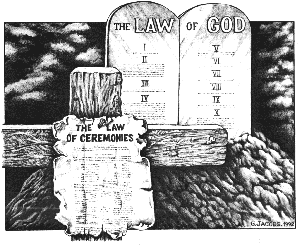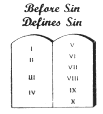

![]()
| God Is | God's Law Is |
|---|---|
| a. Holy. Leviticus 11:44. | a. Holy. Romans 7:12. |
| b. Truth. Psalm 31:5. | b. Truth. Malachi 2:6. |
| c. Righteous. Psalm 145:17. | c. Righteous. Psalm 119:172. |
| d. Perfect. Matthew 5:48. | d. Perfect. Psalm 19:7. |
| e. A spirit. John 4:24. | e. Spiritual. Romans 7:14. |
| f. Eternal. 1 Timothy 1:17. | f. Eternal. Psalm 111:7-8. |
| g. Unchangeable. James 1:17. | g. Unalterable. Psalm 89:34. |
| h. Love. 1 John 4:8. | h. Based on love. Matt. 22:36-40 & Romans 13:8-10. |
![]()
 MORAL LAW (Ten Commandments) |
 CEREMONIAL LAW (Law of Ordinances) |
|---|---|
| 1. Spoken by God. * Deuteronomy 4:12. * |
1. Spoken by Moses. * Leviticus 1:1-3. * |
| 2. Written by God. * Exodus 31:18. * * Deuteronomy 10:3-4. * |
2. Written by Moses. * Deuteronomy 31:24. * |
| 3. Written on stone. * Exodus 31:18. * * Deuteronomy 10:3-4. * |
3. Written in a book. * Deuteronomy 31:24. * |
| 4. Kept inside the Ark. * Deuteronomy 10:1-5. * |
4. Kept in a pocket outside the Ark. * Deuteronomy 31:26. * |
| 5. Complete in itself. * Deuteronomy 5:22. * |
5. Added to and built up. * Leviticus 1:1-3; 4:1-3. * |
| 6. Eternal. * Psalm 111:7-8. * |
6. Temporary. * Hebrews 7:12. * |
| 7. Holy, Just, and Good. * Romans 7:12. * |
7. Contrary and against us. * Colossians 2:14. * |
| 8. Was to be written in the heart. * Jeremiah 31:34. * |
8. Was imposed upon the people because of transgression. * Hebrews 9:9-10. * |
| 9. Points out sin. * 1 John 3:4. * * Romans 7:7. * |
9. Points to the Remedy for sin - our Saviour. * Leviticus 4:27-31. * * John 1:29. * |
| 10. Must not be broken. * Matthew 5:19. * |
10. Is no longer to be kept. * Acts 15:24. * |
| 11. Spiritual. * Romans 7:14. * |
11. Carnal. * Hebrews 7:16. * |
| 12. Law of Liberty. * James 1:25; 2:11-12. * |
12. Yoke of bondage. * Galatians 5:1. * |
| 13. A delight. * Psalm 119:77; 40:8. * |
13. A burden. * Acts 15:10. * |
| 14. Magnified by Christ. * Isaiah 42:21. * * Matthew 5:17. * |
14. Abolished by Christ. * Ephesians 2:15. * |
| 15. Will last till heaven and earth pass away. * Matthew 5:18. * * Luke 16:17. * |
15. Lasted only till the Seed (Christ) should come. * Galatians 3:19. * |
| 16. Standard of judgment. * James 2:12 * * Ecclesiastes 12:13-14. * |
16. Not used for judgment. * Colossians 2:16-17. * |
![]()